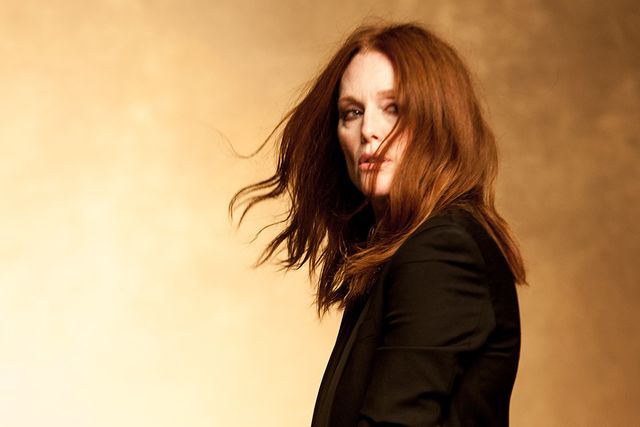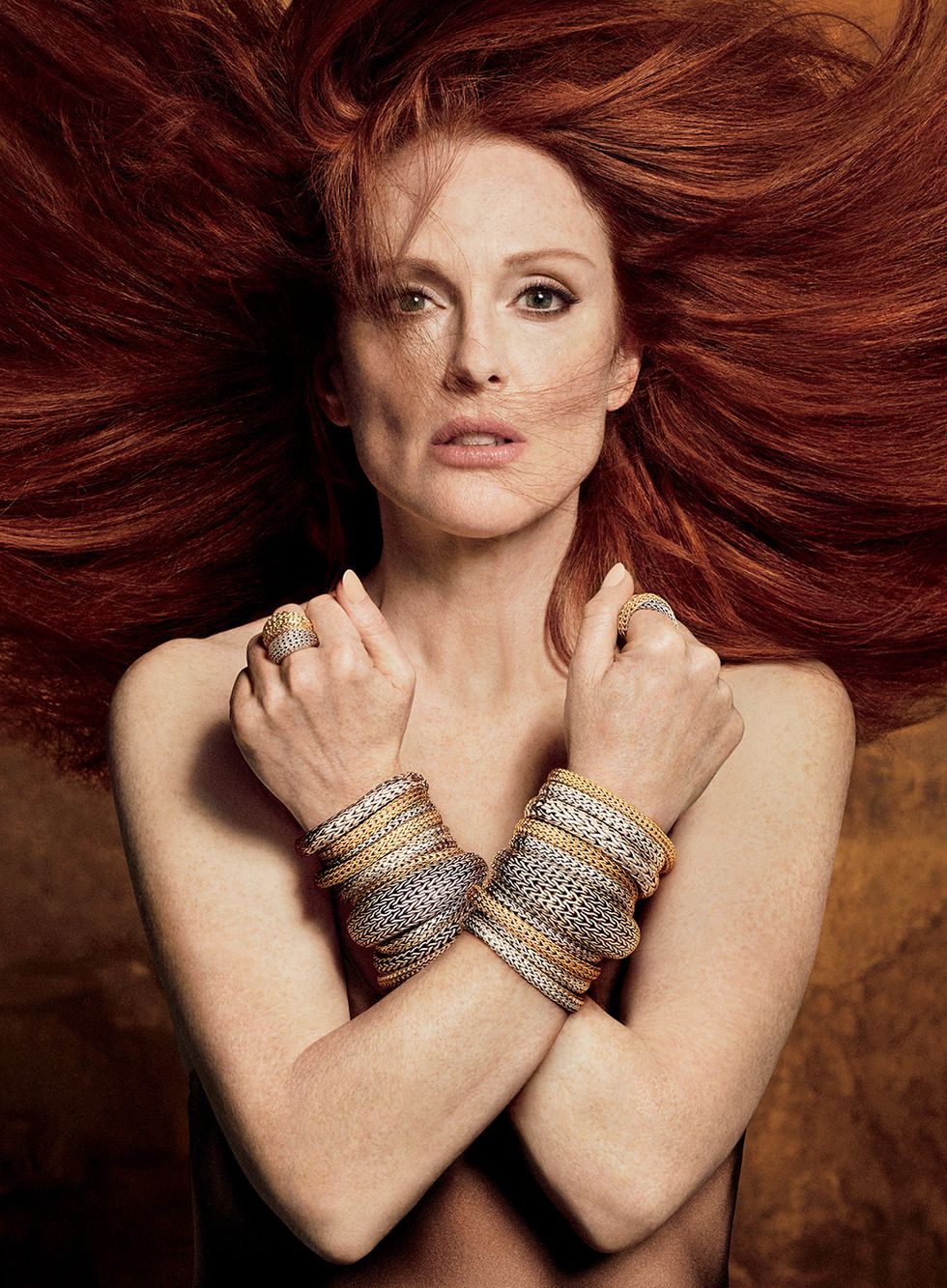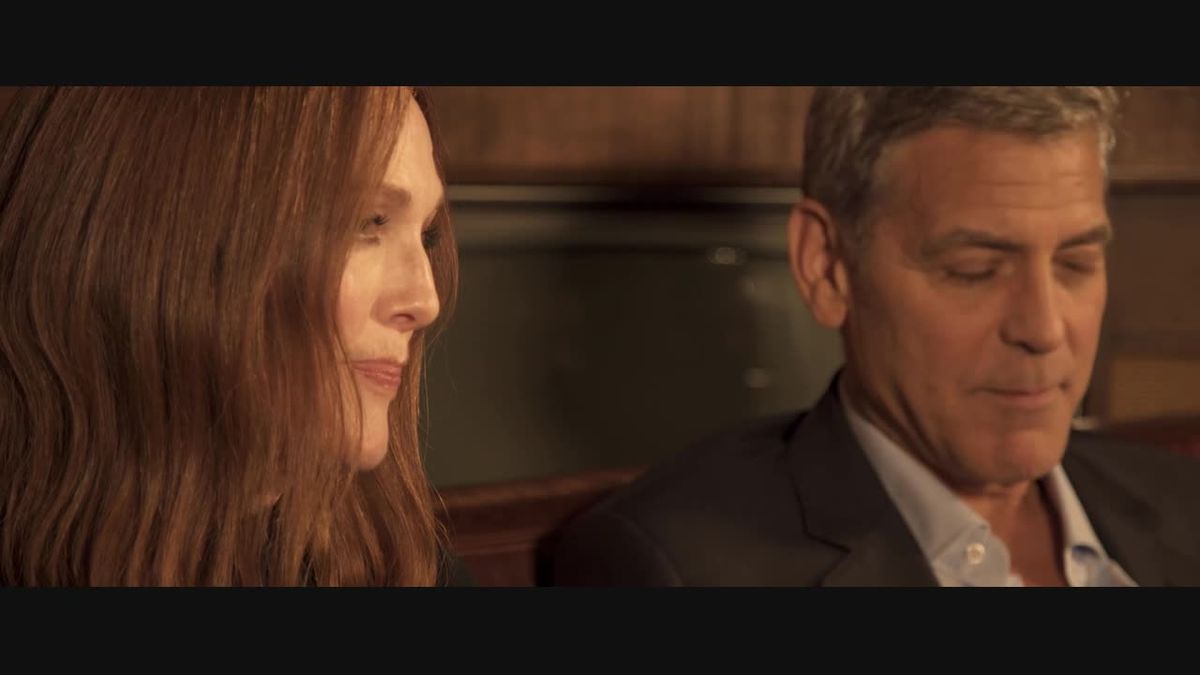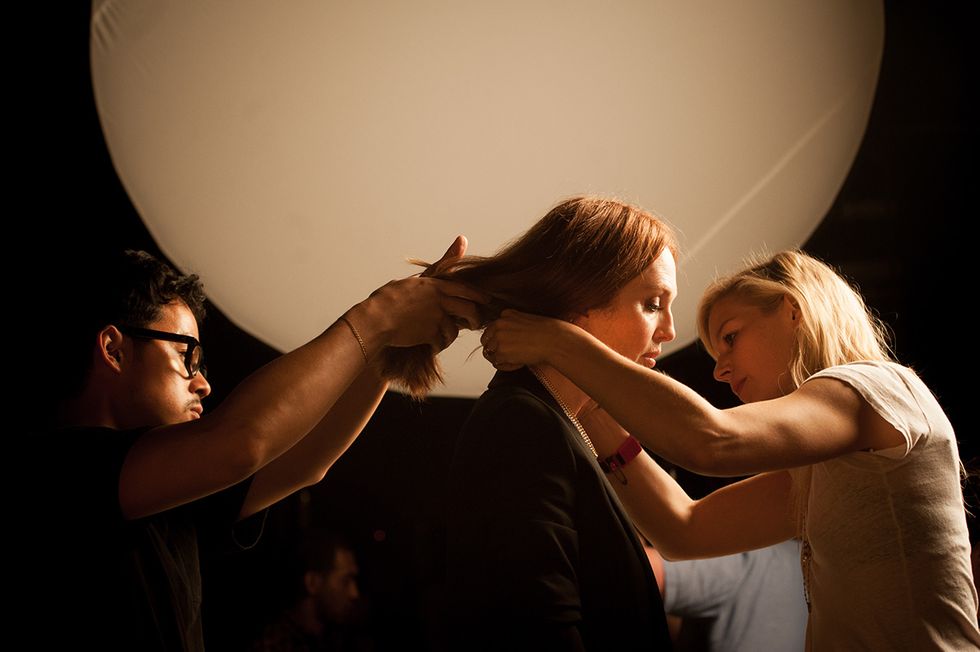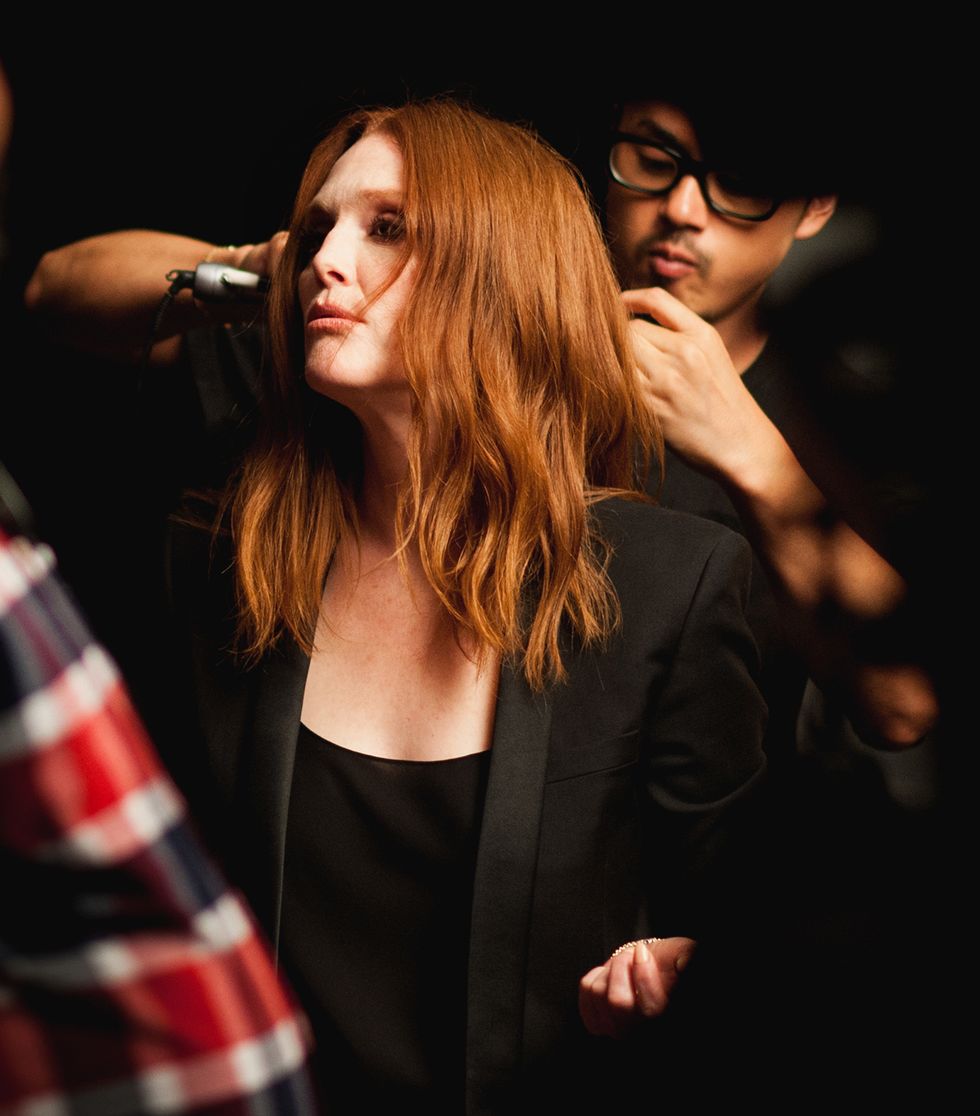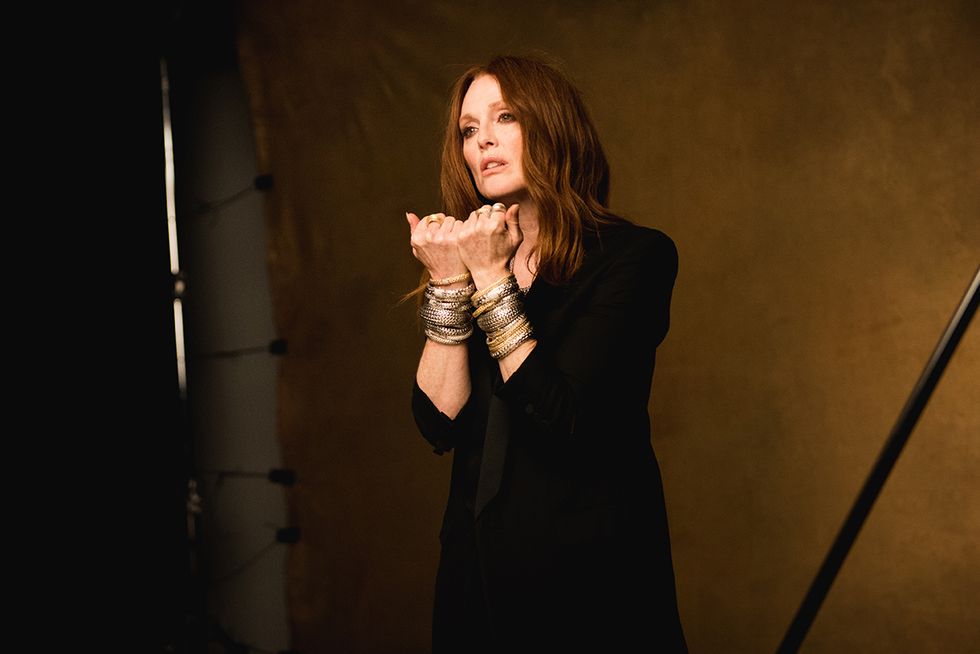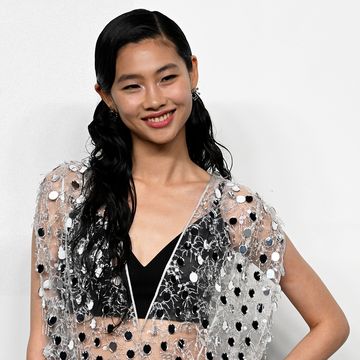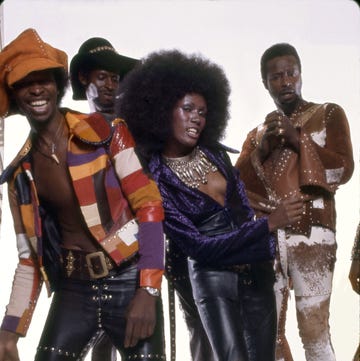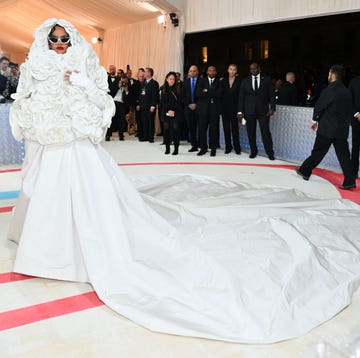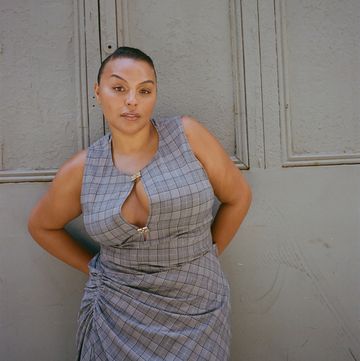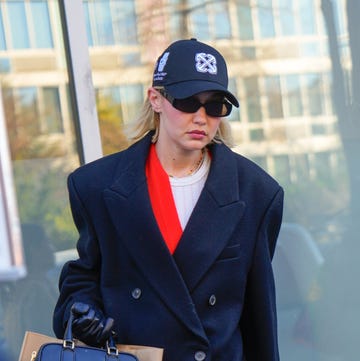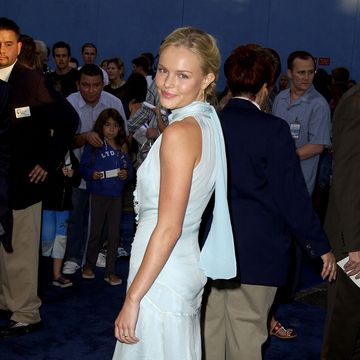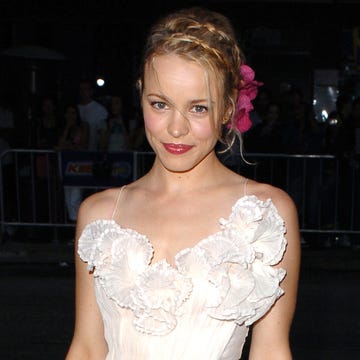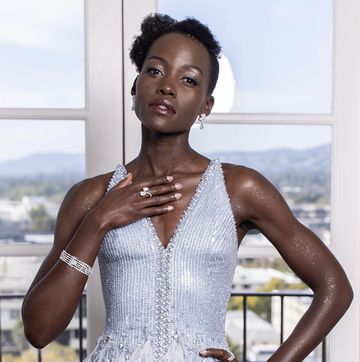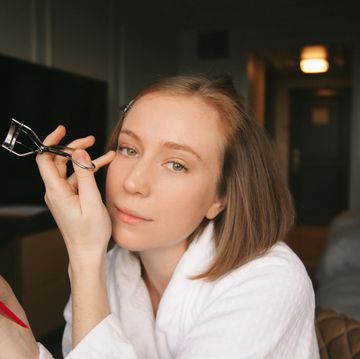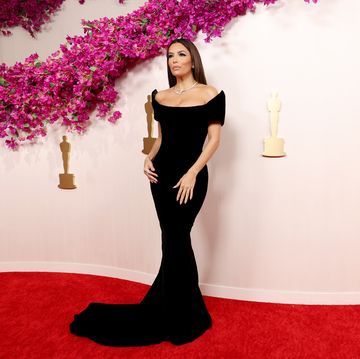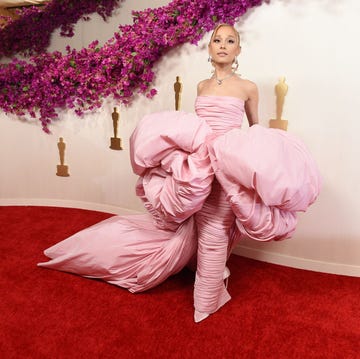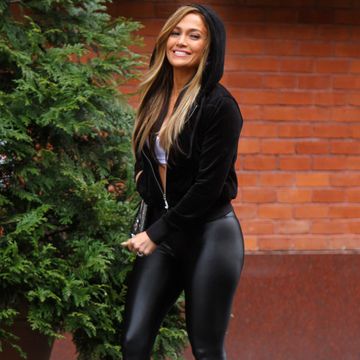Fun fact: Julianne Moore likes green juice as much as you do. “It’s like eating somebody’s lawn,” she laughs after taking a swig of liquid grass before our interview. “Wow,” she coughs. “That’s bad.”
We are on a photo shoot for John Hardy, the Balinese jewelry brand that’s enlisted Moore as their new face. Her wrists are wrapped in their woven metal bracelets; her face dusted masterfully with “no makeup-makeup.” She’s wearing a fluffy white bathrobe and Birkenstocks, and her whole undone vibe is a masterclass in being freckled, 56, and effing awesome.
Of course, Moore is an A-list movie star because of her work as much as her “vibe.” She has an Oscar, a history of progressive activism, and One Degree of Kevin Bacon. (Thanks, Crazy Stupid Love.)
Which is precisely why she’s a perfect candidate for an ELLE.com interview about everyday armor, the evils of taffeta, and how to insist on equal rights in the workplace and beyond.
You must get a lot of campaign offers. Why say “yes” to this one?
It’s created by women, for women, all handmade in Bali. That’s what’s so awesome about it; they actually spend the time and the effort to make truly artisanal jewelry. I find that pretty unusual. So they feel good, they look good, they’re created by women.
And they’ve made you look like Wonder Woman with those wrist cuffs.
[The Wonder Woman effect] is part of it—that’s how they’ve styled it. I think that idea that jewelry is protection or armor is really timely right now. But what I think is interesting is that human beings have always had this urge to decorate, right? Our homes, ourselves—I’m sort of fascinated by how we decorate our surroundings and our bodies. What we choose to wear and how we wear it is fascinating. What identifies us—is it what we identify with, visually? And in the case of this John Hardy stuff, because it’s handmade and because you can wear a lot of them or a little of them, it gives you a lot of flexibility, in terms of how you wear it and what that means.
Some people are very superstitious about their jewelry. They think the metals and stones carry certain powers. Are you into that?
Am I superstitious about jewelry? Absolutely, because it’s personal…jewelry is often sentimental. It’s given to you by someone, so it’s meaningful because it comes with an emotion and a gesture. Or you buy it yourself because it makes you feel a certain way, so it means something to you. It’s rarely something you do thoughtlessly or unconsciously. So yes, I’m very superstitious about that. My engagement ring has my kids’ names engraved in it—we got married after we had the kids, so my husband was like, they should really be part of the ring. I don’t like to be anywhere without it. I feel like something could go wrong! It’s a silly thing, but it’s emblematic of my family.
But it’s because of your kids’ names, not because the metal itself is magic.
Yeah, I don’t think the material itself does it. Like, do I think birthstones mean anything? Not really. I mean, if you don’t like [your birthstone] color, you’ve got a problem. It doesn’t mean you’re rejecting some part [of yourself], it just means it’s not your style. You won’t wear it.
Is there a trick to picking jewelry for a film role?
A lot of times, you can’t wear a lot of jewelry because it makes too much noise on film. You can’t even wear certain fabrics. I’ve had people put taffeta on me, and I’ll go, “This is gorgeous, but no. Forget it. You’re gonna drive [the sound department] crazy.” On movie sets, they even put stuff, like foam, on the heels of our shoes to stop them from clicking.
When you’re filming a movie, do you find yourself shopping as your character?
No, but what I do is I find myself shopping in an environment that’s not my own and bringing it home and being so disappointed. Like, if I’m filming something in the Southwest, and I’m like, “Those cowboy boots, those are perfect.” I get back to New York and it’s like, “Oh no. I cannot.” I do that a lot.
Do you take any costumes home with you? Can you wear them in real life?
I’ve tried, but the one thing I’ve learned about costumes though is you won’t wear them. Even if you’re making a movie that takes place in modern times, and you’re like, “Oh, I love that jacket.” The costume department says, “Oh, you can have it.” So I take it home and I wear it once and I’m like, “No, this isn’t me. This is my character.” It’s like it belongs to someone else.
Can you give some career advice to ELLE readers?
Absolutely.
In a lot of creative industries right now, very young people are becoming “the boss.” As someone who’s worked with directors of many ages, what’s it like working for someone older vs. younger than you? Does it matter?
One of the great things about my business—I can’t speak for anyone else’s—but there isn’t a lot of segregation between the ages. Once you start working, you’re expected to bring it. You can be right out of college and you can be the boss, directing a feature, and you’d better make it work. It’s the same thing with being an actor. One of the things I like most is you’re working with someone who’s 75, 45, 19. You might feel a variety of experiences but the level to which you’re expected to be professional and do your job is always there. If you’re 19, and a 50 year-old knows you can rise to their level, that becomes the expectation every day at work. The same thing if the ages are reversed. It’s great, because there’s a lot of parity. In a lot of businesses, there’s a hierarchical thing where you start as a young person and you go [up]. That doesn’t happen in film. We welcome young people because we need them. We need the energy and the ideas. I have to say, my expectations for every director are the same.
Your job requires you to memorize and recite massive amounts of text. Do you have any advice for memorizing?
Put the hours in and do the work. Read it and read it and read it and read it. You can’t hack your way through the work. You have to just do it.
Obviously, there’s a lot of talk in Hollywood about gender equality, power, and parity. You’re often vocal about women’s rights. Do you have advice on handling the wage gap?
It’s not endemic to Hollywood. It’s something that’s happening all over the world in every profession. One of the things I think is silly is to make equality only about Hollywood, because it's not a Hollywood issue; it's a human issue. There’s equal pay for equal work. The Lilly Ledbetter Act exists because of that. In my industry, we’re so overpaid and over-privileged that it’s silly to use us as an example of fair pay. Especially because we can use the whole world. Treat everyone equally. Period. That’s the issue.
This interview has been condensed for length and clarity.
